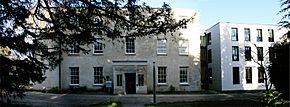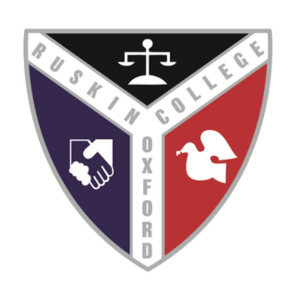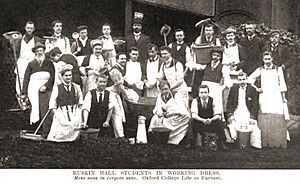Ruskin College facts for kids

Ruskin's Rookery building which is now the Ruskin College Academic Building
|
|
| Motto | "Learning to make a difference" |
|---|---|
| Established | 1899 |
| Principal | Peter John |
| Location |
Dunstan Road, Old Headington
,
,
England
|
| Website | www.ruskin.ac.uk |
 |
|
Ruskin College is a special college in Oxford, England. It is now part of the University of West London. This college is different from the famous Oxford University. It was named after John Ruskin, a famous writer and art critic. Ruskin College helps adults who might not have many school qualifications get a university-level education. Before 2021, degrees from Ruskin were given by the Open University. In 2021, the college joined the University of West London.
Contents
How Ruskin College Started
Ruskin College first opened in 1899. It was called Ruskin Hall, Oxford, back then. The main idea was to give working-class men a chance to go to university. Before this, it was very hard for ordinary people to get a higher education.
Two Americans, Charles A. Beard and Walter Vrooman, started the college. They had studied at Oxford University themselves. They chose Oxford for the college's location on purpose. Oxford was a symbol of top-level education that most working people could only dream of. Walter Vrooman's wife, Amne, also helped by giving money to start the college.
The founders wanted the college to help "working-class reformers" learn effectively. It was also meant to be very affordable. Students could live and study there for a low weekly cost. They also offered courses by mail for even less money. Students learned about things like how the economy works, how society is organized, and the history of workers' rights. They also studied English literature and how people think.
Important Moments in Ruskin's History
Early 20th Century Events
During World War I, many people from Belgium came to Oxford as refugees. About 200 of them stayed at Ruskin College.
In 1908, some students at Ruskin College were not happy with the way things were taught. They felt the education was too traditional. These students formed a group called the Plebs' League. The college's leader, Dennis Hird, supported them. When he was asked to leave, the students went on strike. They refused to go to classes to show their support.
A Big Conference for Women
In 1970, Ruskin College hosted a very important meeting. It was the first National Women's Liberation Conference in the UK. Hundreds of people attended this event. Many people saw it as a huge moment for women's history in Britain. Some of the organizers were students from Ruskin College.
Moving to a New Home
In 2012, Ruskin College finished a big building project. The college's main offices moved to its Old Headington site. This new area has a modern academic building. It includes a much larger library. This library is named the Callaghan Library, after a former Prime Minister, James Callaghan. He gave an important speech about education at Ruskin in 1976. Other buildings on the campus were also updated. The gardens were improved, including a special "crinkle crankle wall." There is also a cafe that is open to the public.
Around this time, some old college records were destroyed. The college said it had to do this to protect people's private information.
Joining a New University
In 2021, Ruskin College decided to join another organization. First, they planned to merge with Activate Learning. But in August 2021, it was announced that the college became part of the University of West London.
College Campus and Buildings
Ruskin College is located in the Headington area of Oxford.
Libraries for Learning
The Callaghan Library opened in 2012. It is a great place for students to study and find books. Students at Ruskin College can also use the famous Bodleian Library. This library is part of the University of Oxford.
How Ruskin College is Run
Ruskin College is now part of the University of West London Group. It also works as a charity. A group of trustees helps to manage the college.
College Leaders
The college is led by a Principal. As of 2024, the Principal is Peter John CBE. He works with a Vice-Principal, Anthony Woodman.
Student Life at Ruskin
Students can find places to live through local private housing providers.
Student Union and Groups
The Ruskin College Students' Union (RSU) represents the students. It makes sure students' voices are heard.
In 2013, the RSU joined a protest at the Oxford Union. This was when a leader of a political party, Nick Griffin, was invited to speak. Famous former members of the RSU include John Prescott and Jack Ashley.
Students at Ruskin can also join the Oxford Union. They can also join other clubs and groups at the University of Oxford.
Famous People from Ruskin College
Many important people have been part of Ruskin College.
Principals of the College
- 1899–1909 James Dennis Hird
- 1909–16 Gilbert Slater
- 1916–25 Henry Sanderson Furniss, 1st Baron Sanderson
- 1926–44 Alfred Barratt Brown
- 1944–50 Herbert Lionel Elvin
- 1950–79 Herbert Delauney "Billy" Hughes
- 1979–89 John Hughes
- 1989–97 Stephen Yeo
- 1998–2003 James Durcan
- 2004–13 Audrey Mullender
- 2014–2016 Dr Chris Wilkes
- 2016–2021 Paul Di Felice
- 2021– Professor Peter John CBE
Teachers at Ruskin
- Clement Attlee, who later became the Prime Minister of the UK.
- Peter Donaldson, an economist and writer.
- Tom Mboya, a politician from Kenya.
- Bill McCarthy, Lord McCarthy, a politician.
- Raphael Samuel, a writer and historian.
Notable Former Students
- Jack Ashley (1922–2012), a Member of Parliament.
- Sally Alexander, a historian and activist for women's rights.
- Judith Cummins, a Member of Parliament.
- Ben Enwonwu, a Nigerian artist.
- Judy Fryd, who started the Mencap charity.
- Fred Harrison, an author and economist.
- Jónas Jónsson, an educator and politician from Iceland.
- Sasha Johnson, a Black Lives Matter activist.
- Lucy Lameck (1934–1992), a politician from Tanzania.
- Tom Mboya (1930–1969), a civil rights hero and Minister from Kenya.
- Adams Oshiomhole, a former Governor in Nigeria.
- John Prescott, a former Deputy Prime Minister of the UK.
- Dennis Skinner, a former Member of Parliament.
- Siaka Probyn Stevens, a former Prime Minister and President of Sierra Leone.
- James Walker, a trade union leader and politician.
- George Woodcock, a general secretary of the Trade Union Congress.
- William Woodruff, a historian and writer.
- Charles Savarin, the President of Dominica.
The Ruskin Fellowship
The Ruskin Fellowship is a group for people who used to study or work at Ruskin College. It helps support the college's goal of offering university education to adults who might not have had the chance before. The Fellowship also has international programs.
The Ruskin Fellowship started in 1911 or 1912. They held their first meeting in May 1912. This tradition continues today with an Annual Reunion every September. The reunion includes talks, social events, and a meeting to choose new leaders for the Fellowship. In 2012, a book was written about the Fellowship's history to celebrate its 100th anniversary.
A small book was also published about the college and the Fellowship during World War One.
 | Georgia Louise Harris Brown |
 | Julian Abele |
 | Norma Merrick Sklarek |
 | William Sidney Pittman |


